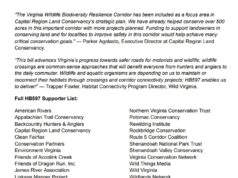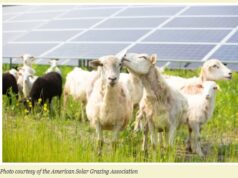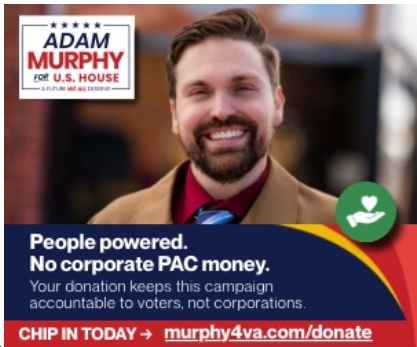by Jon Sokolow
Last week, a group of legislators and environmental organizations held a press conference in Richmond to push a bill they are calling the “Virginia Clean Economy Act” (VCEA). The bill itself, which to date has not been released publicly, was developed in part by an industry trade association called Advanced Energy Economy (AEE).
As others have noted, VCEA’s renewable energy goals are far more timid than, for example, the Green New Deal Act, HB 77, introduced by Delegate Sam Rasoul on December 6. Adam Siegel, a long time energy professional, has called VCEA “business as usual” and noted that it relies on 2018 data from Dominion Energy that already has been rejected as unreliable by the State Corporation Commission. Lowell Feld observed:
“Bottom line: the “Virginia Clean Economy Act” has positive aspects, but in many ways is a bill that would have been great 5 or 10 years ago. Today, given dramatic advances in clean energy technology and costs, we can go much further/faster than in the past, and we absolutely should do so. Actually, strike the words “should do so” and replace them with “must do so,” given the fact that almost every day, a dire new report comes out about the extreme urgency of dealing with the climate crisis.”
Food and Water Watch was more blunt, calling VCEA “a hodge-podge of bad, unambitious policies thrown sloppily together [that] will do little to prevent climate catastrophe.”
Notably, VCEA sets shockingly non-aggressive targets for transitioning to renewable energy. As Adam Siegel noted, VCEA’s goal of 60% “non-carbon” electricty by 2036 actually only proposes that we get 30% from renewables 16 years from now – because we already get half of that target (30%) from nuclear. VCEA is also unambitious in the sense that 30% renewables is something we already are on track to do based on existing projects. In other words, VCEA’s proposal is – in important ways – nothing more than “business as usual.”
Another problem is that VCEA – unlike the Green New Deal Act – contains no moratorium on the development of new natural gas infrastructure. That’s a big problem, as VCEA would allow the development of new fossil fuel projects, like the $600 million Chesterfield “peaker” plant proposed by Dominion Energy as well as expansion of existing facilities – something the science clearly tells us we can’t do if we’re going to avoid climate catastrophe.
The question is why VCEA is so weak.
Let’s start with AEE, which presents itself as “a national association of business leaders who are making the global energy system more secure, clean, and affordable.” But what exactly does AEE mean by “clean” energy? AEE provides the answer: “energy efficiency, demand response, energy storage, natural gas electric generation, solar, wind, hydro, nuclear, electric vehicles, biofuels and smart grid.”
And what exactly is AEE’s mission? To save the planet from the growing climate emergency? Not quite. It’s all about business: “Our mission is transforming public policy to enable rapid growth of advanced energy companies.”
Of course, there is nothing wrong with growing energy companies that truly are committed to wind, solar and other environmentally friendly energy sources. Somebody has got to build the energy grid that we desperately need. And the sooner the better.
But what’s the deal with enabling “rapid growth” of “natural gas electric generation?” After all, methane, the main component of natural gas, is 80 times more potent as a greenhouse gas than carbon dioxide (which is also released when natural gas is burned). And in Virginia, the proposed Atlantic Coast Pipeline and Mountain Valley Pipeline would double Virginia’s emission of greenhouse gases from stationary sources.
Those figures don’t even begin to account for the damage done by the fracking process, the destruction of land and water resources by the construction of gas pipelines or the destruction of land values for landowners whose land is taken by eminent domain to construct those pipelines.
Why would an organization devoted to “clean” energy want to promote the rapid growth of companies devoted to “natural gas electric generation?” The answer, it turns out, is simple.
AEE’s website lists 14 companies that pay an undisclosed amount to join AEE as “leaders.” These “leaders” then “work with AEE’s team of organizational leaders to guide our strategic direction.” The companies guiding AEE’s “strategic direction” include:
- Lockheed Martin, a $100 billion aerospace corporation with headquarters in Bethesda that, among other things, is invested in liquified natural gas. Lockheed Martin also is invested in nuclear power, including in Washington state, where it has been sued by the U.S. Department of Justice because “company officials misled the U.S. Department of Energy into a contract at the Hanford Nuclear Reservation that improperly netted the private contractor tens of millions of dollars in taxpayer-funded profit.”
- Lockheed’s Board of Directors includes one James Ellis, retired President and CEO of Nuclear Power Operations. Ellis is also a member of the Board of Directors of Dominion Energy, which, among other things is heavily invested in both existing and proposed natural gas projects.
- Ingersoll Rand, a $30 billion company that boasts of its investments in oil and gas on its website: “From exploration and production to refining and processing of crude oil and gas products, Ingersoll Rand offers safe and productive solutions that meet the technical and operational challenges of the oil and gas industry.”
- Direct Energy, which sells natural gas plans to businesses and individuals. Direct Energy’s website helpfully explains that “at Direct Energy, we provide our customers with the tips and tools they need to become more savvy consumers and find their perfect natural gas plan.”
- National Grid, whose website notes that “we own and operate gas distribution networks across the north eastern US, located in upstate New York, New York City, Long Island, Massachusetts and Rhode Island. Our networks deliver gas to approximately 3.6 million customers.”
To be sure, AEE also includes more traditional clean energy companies focused on wind and solar generation. And we can assume, for the sake of argument, that it is involved in any number of worthwhile projects.
But ask yourself this. If you were an organization of energy companies whose mission is “transforming public policy to enable rapid growth of advanced energy companies,” and you were hired to develop an energy future for Virginia, would you design a policy that puts a moratorium on new fossil fuel projects, including those from which your “leader” members – the ones guiding your “strategic direction” – benefit? Would you set an aggressive renewable portfolio standard, like 80% renewable energy by 2028 and 100% by 2036, such as that proposed by HB 77, the Green New Deal Act?
Or would you pick a “lowest common denominator” policy, one that slow walks the transition to renewable sources, thus giving companies – including Dominion Energy – invested in fracked gas projects enough years to recoup and profit from their investments (i.e., so that the investments don’t turn into “stranded assets).
In fact, you would pick exactly the sort of “business as usual” “hodgepodge of bad, unambitious policies thrown sloppily together” as is contained in the Virginia Clean Economy Act.
And then you would market it as something that it is not – an aggressive policy that treats climate change as the growing emergency that it is.
Saying one thing and doing another. That’s the Virginia Way.




![[UPDATED 1/29/26] Audio: Sen. Tim Kaine Talks to Blue Virginia About His “Five-Point Plan” to Fight Trump’s Orban-Like Assault on US Democracy; Civil Disobedience a la MLK Jr.; Trump’s Bogus “Energy Emergency”; the Crucial Importance of the 2025 VA Elections; etc.](https://bluevirginia.us/wp-content/uploads/2025/02/kaineinterview2-238x178.jpg)






![Video: Sen. Mark Warner Says He’s “concerned that [the Trump administration] may try out some of their [voter suppression] tactics” in the VA Redistricting Referendum in April](https://bluevirginia.us/wp-content/uploads/2026/02/warner0212-100x75.jpg)
